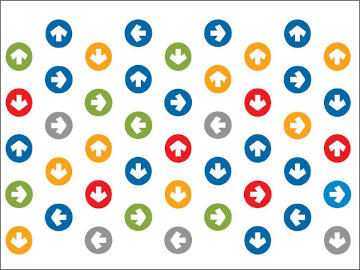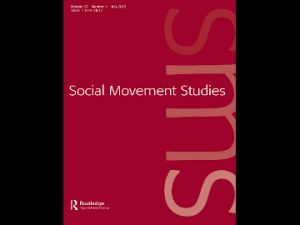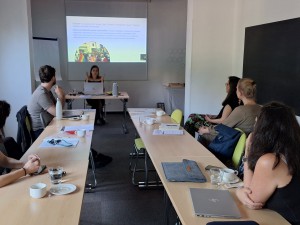Safe arrival programmes for refugees are necessary! COMP4SEE – Complementary Pathways for Southeast Europe: about complementary pathways and the project’s results
22. 12. 2023 | Human Rights and Minorities

Complementary Pathways in South Eastern Europe (COMP4SEE) is a two-year project aiming to develop complementary arrival schemes for persons in need of international protection in three EU Member States – Croatia, Bulgaria and Slovenia. he project aims to encourage the implementation of the EU Common Framework for Asylum and Migration Management and the European Commission Recommendation on Legal Routes to International Protection, both of which advocate for a comprehensive approach to migration, including the expansion of legal routes for third-country nationals in need of international protection and facilitating access to the right to family reunification.
What are complementary pathways?
Safe and regulated routes for refugees offering lawful stay in a third country where their international protection needs are met. Complementary pathways cover a wide range of programmes. These can include:
- Family reunification, which is a right of beneficiaries of international protection and is well known in our country. However, complementary pathways are schemes that go beyond reunification of immediate family members, as family members are involved in terms of wider family ties.
- Humanitarian admissions – through humanitarian visas – which can enable a large number of refugees to leave quickly for a safe country of reception. Humanitarian visas can also be a way of facilitating entry into a country through other complementary pathways, such as family reunification or private sponsorship schemes.
- Study or work-related schemes – schemes for workforce mobility and Study-related schemes that are based on scholarships for university studies or vocational training.
- Private sponsorship schemes – allow individuals, groups of individuals or organisations to support refugees to enter and stay in their country.
See also the COMP4SEE video on complementary routes.
What are private sponsorship schemes?
Private sponsorship is one possible form of a complementary pathway, a safe, regulated, lawful form of arrival where the local community, an individual, or a group of several people takes on a task that was previously the responsibility of the state regarding the arrival or integration of refugees.
Sponsors can be involved in various parts of the process – organizing arrival, the integration process, or financial support.
They can support integration by providing language courses, assistance in finding accommodation and jobs, handling daily administrative tasks, etc. The sponsors can help the persons get involved in local community activities – such as sports activities, religious communities, etc.
Regarding financial support – it could help cover travel costs, health insurance, plane tickets, etc.
It is a lawful, sustainable model that benefits the local community (involvement of the community, sense of connection), refugees (better integration), and the state (individuals and NGOs take on some tasks, although the state keeps key powers).
See also the COMP4SEE video on private sponsorships.
Recommendations
As part of the COMP4SEE project, we carried out research involving consultation with a wide range of national stakeholders – we conducted six focus groups with a total of 28 participants and interviews with 25 stakeholders. These included representatives of refugees and their family members, competent authorities, civil society organisations, faith communities, the private sector, political parties, international organisations, consular and diplomatic missions.
Our empirical research confirmed the need to establish a private sponsorship programme in Slovenia: safe arrival programmes for refugees are necessary to prevent both trafficking and the travel of people in need of protection along the dangerous and costly current (irregular) routes to Europe.
Our recommendation is that private/community sponsorship schemes should first be piloted in the context of government-supported programmes such as resettlement. This would mean that, once the scheme has been designed in consultation with all governmental and non-governmental stakeholders, the state would retain a central role in the selection process, granting refugee status and the arrival of beneficiaries. Beneficiaries would be recognised as refugees and included in the state system of international protection. NGOs/civil society would be engaged in the pre-departure orientation, post-arrival support and integration processes.
All recommendations for the introduction of private sponsorship programmes in Slovenia are available here.
Our empirical research showed that family reunification procedures should be simplified. Different cultural and bureaucratic realities of applicants and their family members should be taken into account in order to secure family unity and an effective implementation of the right to family reunification. Some of them face major difficulties in obtaining the necessary documentation.
All recommendations for improving the Slovenian family reunification system are available here.
COMP4SEE FAMILY REUNIFICATION PROGRAMME
Our project helped refugees to tackle different barriers to family reunification.
European funding has enabled us to help family reunification beneficiaries with legal aid and representation in the family reunification procedures, covering the costs of document translations and various fees, and above all covering the cost of air tickets – all of which add up to a significant burden and high costs that most beneficiaries find difficult to afford.
COMP4SEE Family reunification programme is implemented by PIC – Legal Center for the Protection of Human Rights and the Environment
So far, the COMP4SEE family reunification programme has included:
- 21 families or 85 people (legal aid, translations)
Of which:
- 10 families have been reunited – 15 family members have arrived in Slovenia (+ organisation of travel and accompaniment during travel for vulnerable persons, covering the cost of air tickets).
We will aim to further increase the number of reunited families within the framework of the funding until 30 June 2024.
See also the COMP4SEE video on family reunification.




